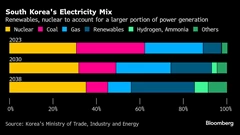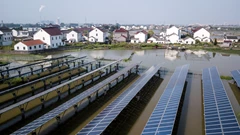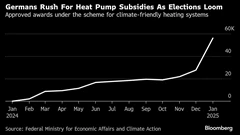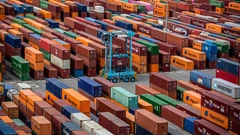German Envoy Says China Emissions Key to World Climate Goal
(Bloomberg) -- Germany’s chief climate envoy said China’s commitments to rein in emissions may determine whether the world can attain a target of limiting global warming to 1.5C above pre-industrial averages.
China, which emits more than twice the volume of greenhouse gases than any other nation, needs to show as much ambition in terms of tackling the problem as it has in innovation, including the world’s fastest roll out of renewable energy, said Jennifer Morgan, Germany’s state secretary and special envoy for international climate action.
Countries including China are expected to submit Nationally Determined Contributions, a commitment on climate measures made to the United Nations, nine to 12 months before the COP international climate summit scheduled for November 2025 in Brazil.
“What China decides to do in its NDC is probably the most important thing to keeping that 1.5 degree target in sight,” Morgan said on Thursday in Pretoria, South Africa’s capital, where she is meeting with officials from the country. We want them to “take up the next level of action and and responsibility,” she said.
Despite its renewable-energy expansion, China’s projection that it will hit peak emissions in 2030 and attain so-called net zero, where it doesn’t emit a net amount of carbon, by 2060 are significantly behind those of Europe and the bulk of developed nations.
Europe’s emissions have already peaked and Germany has set 2045 as its net zero date. China is the world’s biggest consumer of coal, the dirtiest fossil fuel.
Morgan said she doesn’t know if China plans to move its net zero date forward. China’s Foreign Ministry acknowledged receipt of a query about Morgan’s comments but didn’t immediately respond.
She called on the country, as a major emitter, to provide more climate finance. At previous international summits, China has maintained that it’s a developing country and therefore less obliged to commit funding.
The bulk of finance to help developing nations install clean power plants and buttress their infrastructure against climate change should come from nations that industrialized earlier, such as the US and European countries, China has said. The position been supported by developing nations including South Africa.
‘Global Player’
“We are committed to continuing with our leading role in in climate finance but we need to be bringing more funds into the field,” she said. “China has very much positioned itself as a global player on the global stage and with that role comes global responsibilities.”
Germany met its target of providing €6 billion ($6.7 billion) in climate finance a year in 2022.
“There are no pathways to keep that 1.5 degree limit in sight without significantly more financial flows to developing countries,” she said.
Morgan was referring to concerns that if developing nations are not given sufficient finance to develop clean power they will rely on fossil fuels to boost their economies.
(Updates with China’s Foreign Ministry in seventh paragraph)
©2024 Bloomberg L.P.
KEEPING THE ENERGY INDUSTRY CONNECTED
Subscribe to our newsletter and get the best of Energy Connects directly to your inbox each week.
By subscribing, you agree to the processing of your personal data by dmg events as described in the Privacy Policy.
More renewables news

GB Energy Faces New Doubts as UK Declines to Affirm Future Funds

Korea Cancels Planned Reactor After Impeaching Pro-Nuke Leader

Brazil’s Net-Zero Transition Will Cost $6 Trillion by 2050, BNEF Says

SolarEdge Climbs 40% as Revenue Beat Prompts Short Covering

EU to Set Aside Funds to Protect Undersea Cables from Sabotage

China Revamps Power Market Rules In Challenge to Renewables Boom

KKR increases stake in Enilive with additional €587.5 million investment

TotalEnergies and Air Liquide partner to develop green hydrogen projects in the Netherlands

Germany Set to Scale Down Climate Ambitions
















